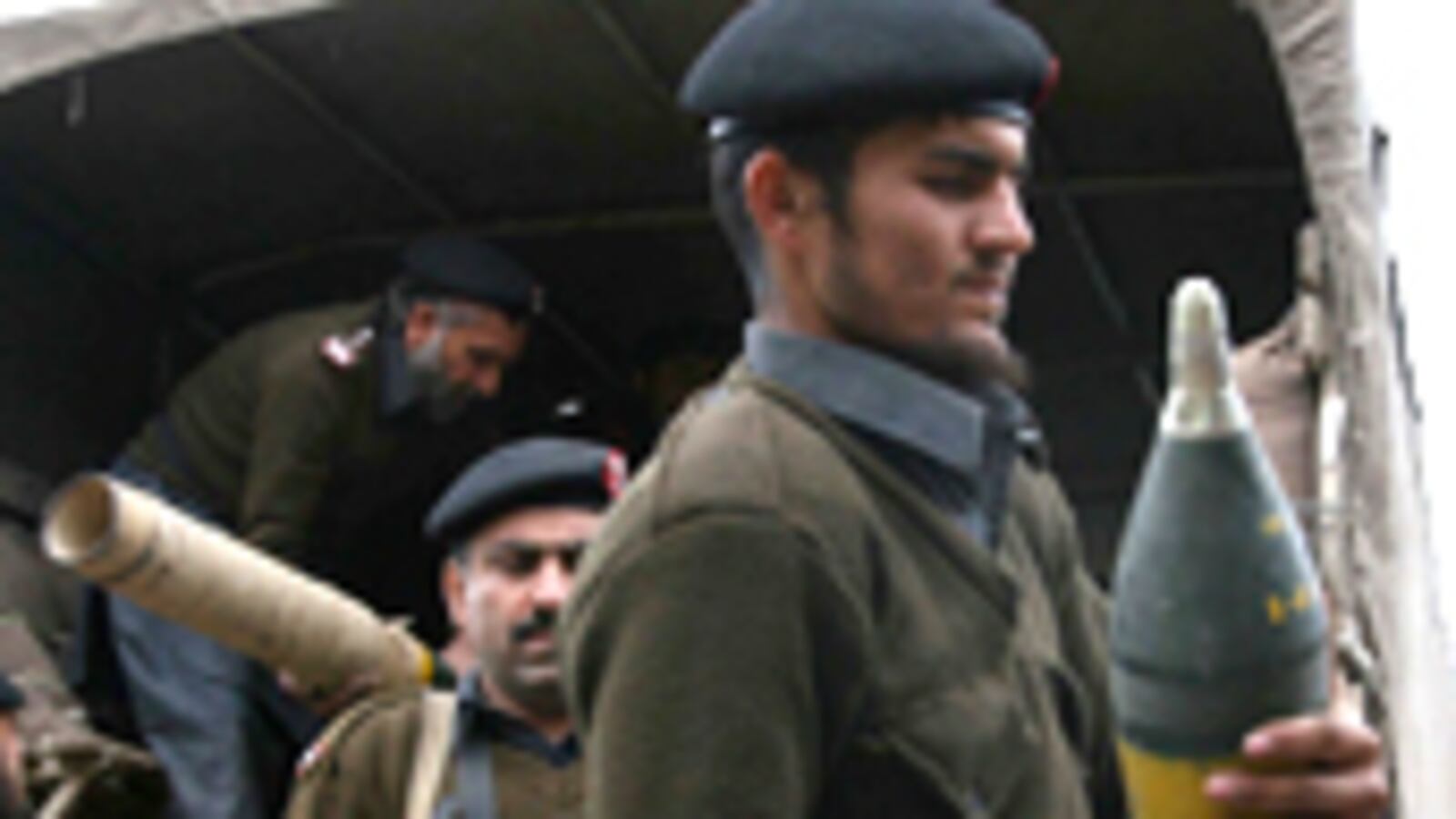
Soon after I checked into the Pearl Continental Hotel in Peshawar, a man in a suit struck up a conversation.
“It’s not often that an American stays here,” he said—not since last year’s truck bombing that wrecked his hotel.
“I have made a particular study of the attack,” added Arjumand Hussein, who transferred here to become the manager, repairing the hotel and improving security. He estimated that it took 37 seconds for gunmen in military uniforms to shoot their way on to the property, park a truck, and blow it up. Hussein says he believed the attackers got away rather than committing suicide, because no remains were found. “I don’t know if you are familiar with the practice of cremation,” he said. “They burn the body at one thousand degrees, and then it takes two or three hours for it to burn away, for every little bit of bone to be gone.”
The top civilian official in Bajour said more than 70 schools were destroyed. A girls’ school was blown up after the army declared victory in Bajour.
I thanked the manager, went upstairs to my room, and parted the curtain. It was directly over the front entrance.
Peshawar is quieter than at the time of last year’s bombing—relatively speaking. When I arrived last Thursday, the universities were closed after a deadly quarrel between students affiliated with political parties. Hussein’s hotel job parallels the task of Pakistan’s government: to restore a run-down and bomb-blasted country even as the convulsions continue.
• Tunku Varadarajan: Paul Bremer’s Victory Lap That task is especially difficult in the tribal areas near Peshawar, the heart of Pakistan’s war against the Taliban, where I traveled as a guest of the military. After years of criticism that the government wasn’t really serious about eliminating the threat of extremist groups, Pakistan has poured thousands of additional soldiers into the region to establish control of its border lands. The government is also working to persuade Americans that it’s doing all it can. The army provided a truckload of soldiers as escorts, and we took a circuitous route to avoid areas not considered secure.
On the map, the tribal areas are not far from Peshawar, a frontier city that spreads out on either side of the road to Kabul. In reality, the tribal areas are a world apart. Some roads leading in and out have crumbled away. As you bump along, pale green mountains come into view, many seeming almost vertical. You pass through green river valleys, and through village bazaars where men sell sacks of grain. Women are hardly visible, for this is the land of deeply conservative ethnic Pashtuns.
In the area known as Bajour, soldiers drove me to the spot where Pakistan’s military recently proclaimed a much-publicized triumph. They blasted a Taliban stronghold to pieces, driving out a Taliban leader who convened Islamic courts and hid from American drone attacks inside caves.
I was just as interested in what Pakistan will do next.
Before coming this far, I’d called the Pakistani writer Ahmed Rashid, who said he wasn’t sure his country has achieved anything lasting yet in Bajour. Militants seemed to shift from place to place in what he called “whack-a-mole.” Rashid said he had no idea how the government planned to rebuild the tribal zones, or integrate them more fully into Pakistan.
Along the road I saw buildings destroyed during heavy fighting. Students are returning to school after a long absence, but many have nowhere to go. The top civilian official in Bajour said more than 70 schools were destroyed. A girls’ school was blown up after the army declared victory in Bajour.
The local commander, Brigadier Zafar ul Haq, welcomed me with a cup of tea and showed me a rogues’ gallery on his office wall. He had snapshots of assorted Taliban leaders. “Some of them were killed, most of them, they fled,” he said.
Some reached other tribal areas, where fighting continued last week. The two most prominent leaders, Maulvi Faqir of Pakistan’s Taliban, and Qari Ziaur Rehman of the Afghan Taliban, may have found a haven across the international border.
“Last night I had some intelligence that they are in Afghanistan,” Brigadier Zafar said. “We have been hearing the international media blaming Pakistan, that [the Taliban] have safe havens in Pakistan, but in Bajour I can now say with complete confidence that it is the other way around.”
Bajour residents said the economy has not recovered even to their modest standards. Too many people are still outside Bajour, living in a refugee camp. I’d visited that camp, called Jalozai, where tents stretched to the horizon on both sides of a road. Even though they’ve been invited to return home, many people stay, living on sacks of American-supplied grain.
This was on my mind when I met General Tariq Khan, who as commander of Pakistan’s Frontier Corps, is in charge of the troops operating in five “tribal agencies,” as these rural lands have been known since the British ran South Asia.
Americans, I reminded him, have struggled to define goals in Afghanistan that are realistic and affordable. “Have you struggled to determine your goals in the tribal areas?”
“No we haven’t,” he said. “I’m very clear about it: writ of the government and the ownership by the people.” The general wants to restore the political structure that has lasted since British times: The national government sends a “political agent” who works through tribal leaders to get things done. The system lost credibility in recent years, as Muslim mullahs denounced the tribal leaders as corrupt. That was part of the reason the Taliban grew.
Eventually, General Tariq said, the system should be replaced. But for now it’s enough to restore the rule of law. “That’s happening,” the general said, even though, he acknowledged, “you hear an odd bomb going off here and there.”






